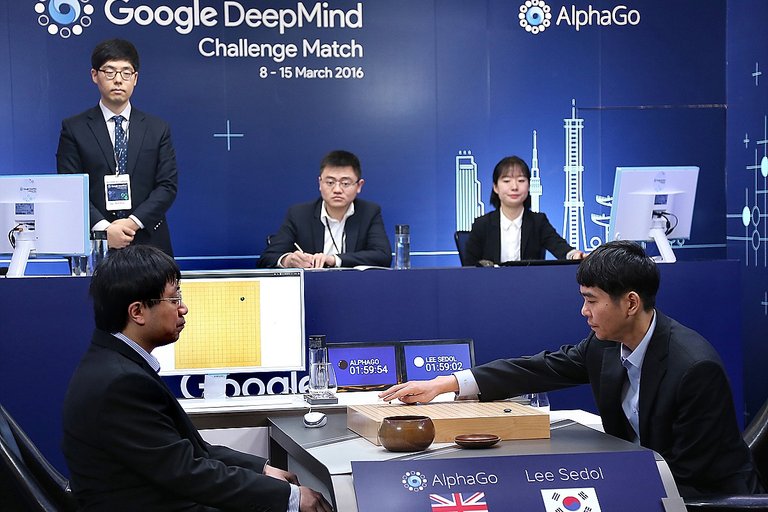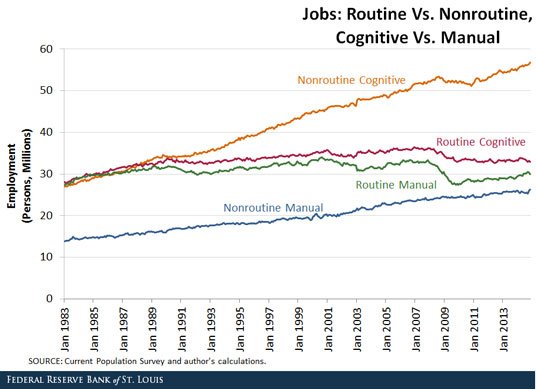Over the 20th century, the development of automated machinery has propelled modern industry and manufacturing into new heights of productivity. However, the cost of this technological advancement has been the displacement of millions of blue collar jobs across the world. In contrast, white collar labor has always been regarded as safe from the automation that has contracted the manufacturing workforce. The thought of machines replacing educated and skilled professionals has usually seemed a distant problem of the future -- that is, until now. In the past few years, progress in artificial intelligence has skyrocketed and computers are now learning to solve complex problems better and faster than human beings. As learning algorithms and computing power continue to advance, many jobs that were once thought to be impossible to automate are slowly but surely converting to a silicon workforce.
Luddite Fallacy
Fears of automation can be traced back to the Luddites of the early 1800s. The luddites were skilled, middle-class weavers and textile artisans whose work became virtually obsolete due to the introduction of weaving machinery. This dramatic economic change due to advancing technology, combined with a lack of social and labor rights, caused many luddites to revolt against factory owners out of desperation. In the 20th century, the role of luddites were assumed by craftsmen and manual laborers of all kinds and automated robots took the place of manually operated weaving machines. Automation has now penetrated every part of the manufacturing process and in the United States there exists one automated industrial machine for every 500 workers. For the most part, industrial machines in the 20th century were created to complete very fixed and specific tasks. This technological cycle is familiar and has occurred multiple times over the past two centuries with a general consensus that they only cause temporary displacement of labor and do not lead to mass unemployment in the long term. However, the latest wave of AI has introduced a new challenge that has never been encountered before: what happens to humans when machines are able to learn?

Deep Learning // DeepMind
Artificial intelligence has seen recent success mainly due to a combination of concepts known as neural networks and deep learning. This development is only recently practical due to the computing power of modern graphics processing units. It aims to mimic the workings of the human brain and allows AIs to learn complex tasks through pattern recognition over vast amounts of training data. These techniques, combined with the massive amounts of data gathered by tech giants like Google, Facebook, Amazon, and Apple, have resulted in remarkable achievements that were previously thought to be years out of reach.
Google’s DeepMind technology, which it had acquired in 2014, has been a pioneer in the machine learning field and is a great example of how far AI has advanced in such a short amount of time. In just a few years, DeepMind has been successfully applied to relatively simple tasks like detecting spam emails, to more complex problems such as determining cases of eye disease from images of retinal scans. In 2015, it had successfully learned to play 29 Atari video games completely on its own and by 2016, the Deepmind-trained AlphaGo AI famously became the first computer to ever beat a top professional Go player.
A more practical example is Android’s speech recognition which is powered through communication with a network of 16,000 computers and 100 billion connections collectively known as Google Brain. AI has also made its way into the automotive industry through a joint effort by Google and Nvidia, a manufacturer of cutting edge processors, to apply neutral networks to self-driving cars. Although most AI research is conducted by US owned and operated companies, China is also investing heavily in the field and is rapidly closing the technology gap. Baidu, which is generally regarded as the Chinese equivalent to Google, even employs a team of its own AI scientists in Silicon Valley and is an example of how tech giants in China are accelerating their research to compete. There is still much work ahead, but Google and other industry leaders have proven that the possible applications for DeepMind, and machine learning in general, are enormous.

Birth of an Industry
The market opportunities of this new wave of AI have not gone unnoticed, and from 2010 to 2015, investment into artificial intelligence companies quadrupled to over $8 billion and has spawned numerous AI companies aiming to disrupt various industries with automated programs that can outperform their human counterparts. One AI startup called Enlitic has successfully developed a system which can process CT scans of lungs and automatically identify features that are likely to signal malignant tumors. When the performance of Enlitic’s AI was compared to that of human radiologists, not only was its false-positive rate 50% better, but it also managed to identify every single tumor in the test case while the human radiologists had allowed 7% to go unnoticed. These types of applications will continue to develop at a rapid pace over the coming years as investment into AI companies increases.
Collarblind
Such a massive potential for disruption across so many markets brings concerns over just how many people may be threatened by job loss due to automation. In a study by the Reserve Bank of St. Louis, it was found that routine jobs for both manual and cognitive labor have already declined in the past twenty years:

(https://www.stlouisfed.org/on-the-economy/2016/january/jobs-involving-routine-tasks-arent-growing)
Computer scientist Jerry Kaplan, author of the book Humans Need Not Apply, describes this phenomenon succinctly by explaining that “the new coming wave of automation is blind to the color of your collar.” More and more routine office jobs like customer support and clerical work are able to be automated by trained AI. This encroachment of automation into white collar labor has some economists alarmed while many will argue that in the long run, automation actually creates more jobs than it replaces. Machines are best at completing repetitive tasks and increase overall productivity which frees up workers to focus on more intellectually challenging or creative work. Computers will also still need people to program, operate, and manage them.

At the annual meeting of the World Economic Forum in Davos, IBM CEO Ginni Rometty argued that advanced AI, like IBM’s Watson suite, will do more to complement human capabilities rather than completely replacing them. Rometty envisions “a partnership between man and machine” and is confident that although “advances in artificial intelligence will lead to job losses, ... new forms of employment will take their place.”
Labor Redefined
In many cases, automation does more to redefine a job rather than replace it entirely, even if its negative effects are more visible and straightforward than its benefits. When the automated teller machine, or ATM, was introduced to automate basic and routine banking functions, it did not destroy the role of a bank teller; rather, banks operated more efficiently and employee roles shifted to more complex tasks and service work, allowing more locations to open in the long run and leading to an overall increase in the amount of banking jobs. Although it is easy to see the jobs that are being rendered obsolete by emerging technology, the new possible industries that can result out of such economic shifts are much more difficult to predict. For example, the prospect of modern computers explained to people 100 years ago may have sounded as a terrifying job-killer, but they also could have never imagined all the various careers in the software industry which emerged as a result of current technology.
Nonetheless, this new wave of automation threatens to disrupt developed economies more than any other in the past due to the prevalence of computers in virtually every industry and the sheer range of tasks that machine learning can be applied to. There is real danger in allowing populations to become too dependant on routine labor without being prepared to educate and train workers who are displaced by automation towards more resilient or emergent careers. Governments and employers must be ready to react to the worst scenarios where job losses accelerate more than expected and the unemployed are unable to safely and easily transition into other fields.
Lifelong Learning
Key factors in mitigating the negative impacts of automation will be easy and constant access to education and job training. As it becomes increasingly apparent that a single 4-year college education may no longer support an entire life’s worth of labor, the idea of lifelong learning is taking hold as a crucial aspect of modern society. A great example of this trend is in the development of Massive Open Online Courses, or MOOCS, which provide education in the form of free video lectures and online coursework. These courses aim to be flexible enough to be taken alongside a full-time job while also providing enough content to effectively teach a certain subject or skill. Quite ironically, one of the most popular MOOCs is the Machine Learning course provided by Stanford and taught by the renowned computer scientist and former head of AI at Baidu, Andrew Ng Ng recognized the coming market disruptions that AI would cause and co-founded a MOOC platform called Coursera which hosts his popular machine learning class. At the 2017 Stanford MSx Future Forum, Ng gave a talk on the state of artificial intelligence and outlined his thoughts on what the future may hold -- here is what he had to say:
Source:
[1:01:32] “I think one of the biggest challenges of education is motivation right? As in, it’s really good for you to take these courses and study, but It’s actually really difficult for an individual to find the time, and the space, and the energy to do the learning that give them these long-term benefits.”
[1:01:54] “With AI displacing a lot of jobs I’m confident that there will be new jobs but I think also we need a new educational system to help people whose jobs are displaced reskill themselves to take on the new jobs.”
[1:02:22] “I think government should give people a safety net, but pay the unemployed to study, right, to provide the structure that helps the unemployed to study so as to increase the odds of gaining the skills needed to re-enter the workforce...”
Essentially, Andrew Ng is calling for a reinvention of the modern educational system in combination with a stronger public safety net in order to help prevent individuals from becoming economically irrelevant in an increasingly automated society.
Basic Income
But what happens when education and basic welfare are not enough? There are now serious discussion among economists of introducing some form of universal basic income, or UBI, in developed economies which will provide a fixed amount of income to entire populations. Some believe that a UBI would turn societies lazy and criticize the concept as far too utopian, but advocates argue that if individuals do not need to constantly worry about making a living income, they will be free to both educate themselves better and focus on career paths that are more fulfilling and beneficial to their society. Another argument for UBI is that, eventually, automation will become so prevalent that there simply will not be enough work to go around, making a redistribution of wealth the next logical step.
Of course, such a simple solution is bound to have limitations and a UBI introduces an entirely new set of issues. Giving everyone an equal amount of income is an inefficient way of assisting those who are hardest hit by job loss, and should be directed towards those who will struggle most with adapting to changing economic conditions. Geopolitical concerns are also aplenty with concerns over open borders and immigrant welfare abuse in a world already tensely divided on such issues. There are many ways that a basic income can be approached, but much research and experimentation needs to be conducted in order to find strategies that work the most effectively. In January 2017, the Finnish government did just that by kicking off an experiment which aims to study the behavior of 2000 Finns who will receive an unconditional basic monthly income of $587. The program will last two years and, if successful, could eventually lead to a universal income across the entire country. Other pilot programs are also taking place in California, the Netherlands, India, Uganda, and Kenya by both public and private organizations.
A Brighter Future
Properly addressing the drawbacks of AI will allow us to greatly appreciate the many benefits it provides. Fleets of self-driving cars will eventually transform everyday transportation and less people will need to own cars. The widespread adoption of automated taxis will lead to much less space needed for parking, less pollution, and more importantly, a drastic reduction in traffic accidents due to human error. Healthcare will become more decentralized as machines take over more routine roles of doctors and nurses. With the help of AI, patients will be able to accurately diagnose and treat themselves and free up space in overcrowded hospitals which will be increasingly dedicated to emergency care. AI is also being used to improve scientific research by processing huge amounts of data and finding patterns that would have been nearly impossible for humans, such as interpreting genome data or analyzing particle collisions. Manufacturing will become safer as employees are more removed from the physical processes of factories and allow AI to operate more dangerous machinery. The advancement of natural language processing and personal AIs like Apple’s Siri or Amazon’s Alexa allow new, more human ways to interact with technology that are more accessible to the elderly or disabled.
We are entering a golden age of artificial intelligence and there is no doubt now that it is already beginning to revolutionize the world economy as we know it. As a result, education will become more important than ever and we may soon find ourselves questioning the very concept of “work” itself. Adapting to the AI revolution and redefining modern society around it will certainly be one of the greatest challenges of the 21st century.
Congratulations @nathanab! You have completed some achievement on Steemit and have been rewarded with new badge(s) :
Click on any badge to view your own Board of Honor on SteemitBoard.
For more information about SteemitBoard, click here
If you no longer want to receive notifications, reply to this comment with the word
STOPCongratulations @nathanab! You received a personal award!
You can view your badges on your Steem Board and compare to others on the Steem Ranking
Vote for @Steemitboard as a witness to get one more award and increased upvotes!